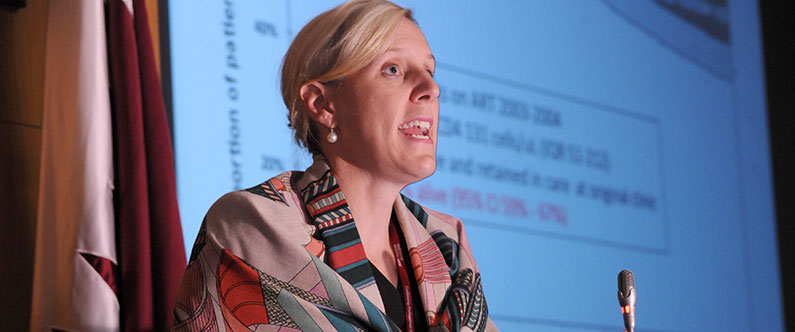WCM-Q Grand Rounds speaker targets 'end to AIDS epidemic'
 Dr. Molly McNairy of Weill Cornell Medicine in New York said that great progress had been made in the global battle against HIV and AIDS but that there is still much work to be done.
Dr. Molly McNairy of Weill Cornell Medicine in New York said that great progress had been made in the global battle against HIV and AIDS but that there is still much work to be done.
The successes and remaining challenges of the global mission to eradicate HIV were discussed at Weill Cornell Medicine-Qatar’s (WCM-Q) Grand Rounds.
Visiting global health expert and leading HIV/AIDS researcher Dr. Molly McNairy of Weill Cornell Medicine in New York explained that well-funded programs to provide lifesaving anti-retroviral drugs to patients in developing countries had helped reduce the number of AIDS-related deaths worldwide by around 45 percent from 2004 to 2015.
Despite this success, there are approximately 37 million people living with HIV worldwide and 70 percent of them are in resource-poor countries in sub-Saharan Africa. In some areas of sub-Saharan Africa, HIV prevalence among adults is around 25 percent.
Dr. McNairy, The Bonnie Johnson Sacerdote Clinical Scholar in Women’s Health and Assistant Professor of Medicine, said that investment in building clinics in low-resource settings had managed to deliver anti-retrovirals to around 18 million patients all over the world, up from fewer than 50,000 in 2004. Research estimates that survival rates for HIV patients in low-resource settings who link with specialist HIV clinics can be as high as 71 percent – comparable to survival rates in the United States. Much of this success has been achieved thanks to significant investment since the early 2000s by organizations such as the Bill & Melinda Gates Foundation and the United States President's Emergency Plan for AIDS Relief (PEPFAR).
Dr. McNairy said: “Research shows that where treatment is followed HIV has shifted from being pretty much a death sentence to being a chronic primary care disease.
“That’s the good news - how much has been done in the last ten years. But despite this success we are very far from our goal. We still have over 15 million additional patients who need treatment, 2.1 million newly infected HIV persons a year, and over a million AIDS-related deaths a year. Now we are left with a conundrum – can we end the AIDS epidemic? Can we get to zero new HIV infections? Can we have zero AIDS-related deaths and can we have zero discrimination?”

Dr. McNairy then proposed a framework called the HIV Care Continuum in which HIV patients are diagnosed, linked to care by being enrolled in a clinic and then retained in care so they can receive counseling, diagnosis and management of opportunistic infections, and as promptly as possible start anti-retroviral treatment. When anti-retroviral treatment is taken regularly for an extended period the HIV virus becomes suppressed - the patient is not cured but their viral load is greatly reduced, life expectancy increases radically and the likelihood of transmission to another person is diminished.
Dr. McNairy said: “The end-point of the continuum is viral suppression, but failure in any one step results in overall system failure, so developing robust systems will give us our best chance of achieving our goal of zero new HIV infections and zero AIDS-related deaths.”
Dr. McNairy then explained her work in Haiti, which has the highest prevalence of HIV infections in the western hemisphere, where she is part of team working to develop more effective continuum of care systems.